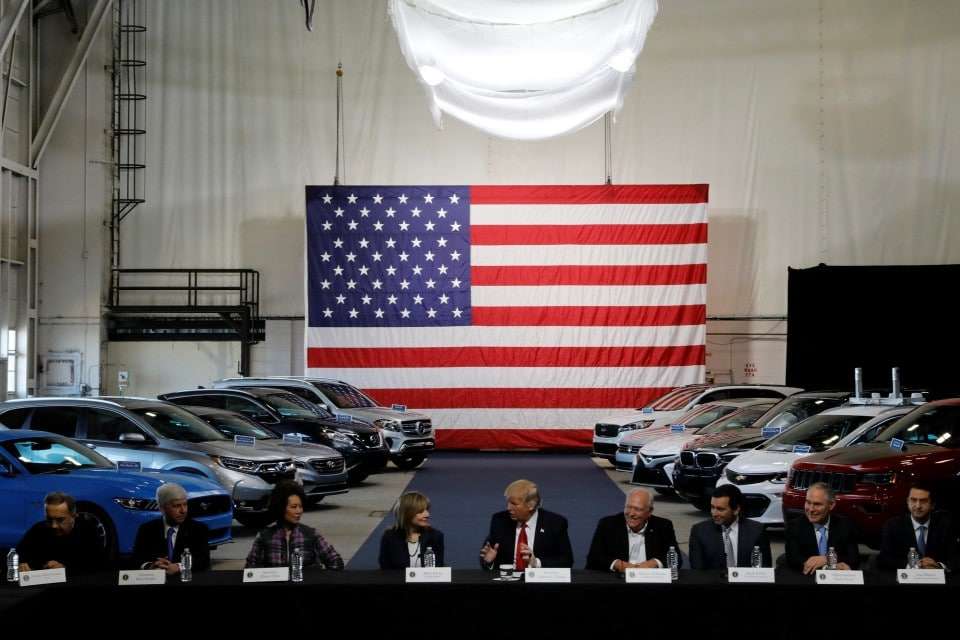The Volokh Conspiracy
Mostly law professors | Sometimes contrarian | Often libertarian | Always independent
Is the proposed 'border adjustment' tax unconstitutional?

This month, conservative superlawyer Theodore Olson took to the pages of The Post to argue that the "border adjustment" tax proposed by the House Republican leadership is not merely bad policy, but unconstitutional as well.
Olson's constitutional arguments were interesting, but I did not find them wholly persuasive. Then again, I'm hardly an expert on tax law or the constitutional limits on the federal government's taxing power. Fortunately, I have a colleague who is: professor Erik Jensen. So I asked Jensen for his thoughts on the Olson argument, and here is how he responded:
I assume that Ted Olson's goal with his op-ed was more political than legal: with the idea planted that the border adjustment tax (BAT) might be unconstitutional, enactment of the tax would be less likely. Olson might have been successful in that effort (and the president isn't enthusiastic about the BAT anyway), but Olson's confident presentation hides the many weaknesses in his argument.
1. Olson considers the meaning of "incomes" in the 16th Amendment, which provides that a "tax on incomes" is exempt from the apportionment requirement that otherwise applies to direct taxes, as if the Amendment were unquestionably relevant. (The amendment was a reaction to Pollock, the 1895 Supreme Court decision striking down the 1894 income tax because it was a direct tax - at least insofar as it reached income from property - and it hadn't been apportioned.) But most commentators think the court was wrong in Pollock. I disagree, but, if that argument is right, the amendment was unnecessary as a legal matter and the meaning of "incomes" in the 16th amendment wouldn't matter. And Chief Justice John Roberts's opinion in NFIB v. Sebelius, citing precedent, suggested that the category of direct taxes includes only capitations and taxes on property. (A tax on the transfer or importation of property wouldn't be a tax on property for these purposes.)
2. But let's assume the 16th Amendment does matter. At times Olson seems to be arguing that BAT's denial of a deduction for the cost of imported goods would make the otherwise unquestionably constitutional income tax into something else for a business taxpayer. Olson is right that the drafters and ratifiers of the 16th Amendment thought that, to be exempted from the apportionment requirement, an income tax could reach only net income. If so, the cost of goods sold has to be taken into account in determining income. But Olson overstates the case by saying that taxpayers must be able "to deduct the full cost of goods sold." It's always been understood that Congress has some leeway in deciding what costs are deductible and what aren't. (Leeway is necessary if only because there can be legitimate disputes about whether a particular cost should be deductible.) Maybe the magnitude of deductions that would be denied with the BAT in place is so great that, for some taxpayers, the resulting tax wouldn't be on "income." But that's not obvious to me.
3. If it's appropriate to look at the BAT as a stand-alone tax that reaches imported goods, rather than a limitation on deductions available under the income tax, Olson concludes that the BAT would be a direct tax that would have to be apportioned to be valid. (Congress hasn't apportioned any tax since 1861. Concluding that a particular proposed tax would have to be apportioned would be a killer in the legislative process.) But the Constitution explicitly provides that "duties, imposts and excises" - what are usually called indirect taxes - need to satisfy only the uniformity rule. (Indeed, except in very special circumstances, it would be impossible to have a particular tax simultaneously satisfy both the uniformity rule and the direct-tax apportionment rule. It's one or the other.) "Imposts" are duties on imports. Why would the BAT not be such an indirect tax?
4. To my mind, the most questionable aspect of Olson's analysis is that he doesn't seriously consider who would be subject to the BAT. I could be wrong, but it seems to me that the effect of the BAT would be felt overwhelmingly by corporations. (You know, General Motors importing parts from around the world, to be incorporated into vehicles manufactured in this country.) Yes, in some cases, corporations may be able to pass on some of the cost of the BAT to consumers, but the BAT would in form fall on corporations. For a corporate taxpayer, just about everything Olson wrote is irrelevant. Congress enacted an unapportioned corporate income tax in 1909, before ratification of the Sixteenth Amendment, and the Supreme Court, in 1911 (still before the amendment), concluded that the corporate income tax is an excise imposed for the privilege of doing business in corporate form. The tax is thus an indirect tax, not even potentially subject to apportionment. If it's not a direct tax to begin with, it wouldn't matter whether the tax base is income or not income.
I don't know how these principles would apply to passthrough entities, like partnerships, limited liability companies, and S corporations, where generally there is no entity level tax. I'd have to think more about that - which I'll do if the possibility of a BAT is really taken seriously in Congress. But I am sure that nothing Olson said is relevant to the corporate income tax.
For additional thoughts about the merits of Olson's constitutional arguments, see this post by Gerard Magliocca at Concurring Opinions and this comment by Joe Henchman of the Tax Foundation.


Show Comments (0)